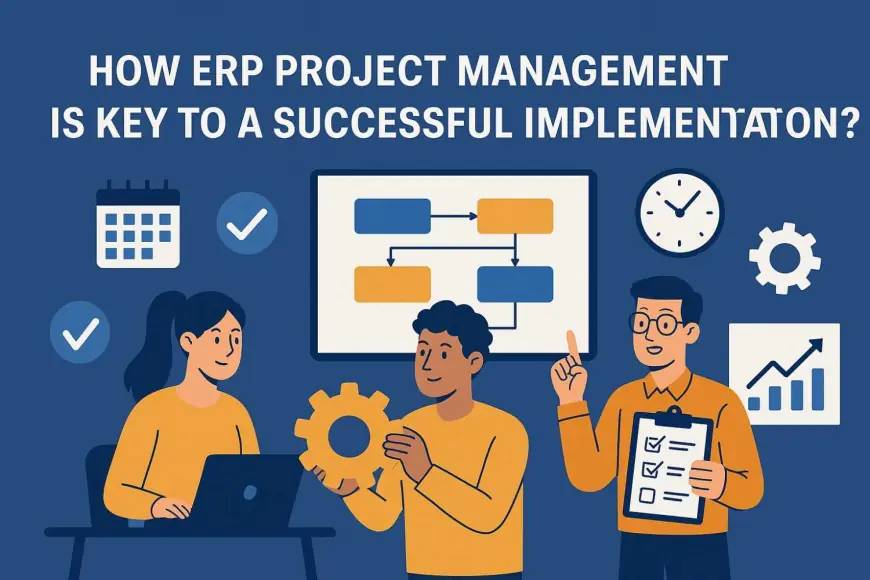How ERP Project Management Is Key to a Successful Implementation?

Let’s get this out of the way—implementing an ERP system without project management is like baking a cake without a recipe... with your eyes closed... in a wind tunnel.
Sure, you might get something edible. But if you're aiming for a moist, fluffy masterpiece (read: a seamless ERP implementation), you need structure, planning, and a whole lot of coordination. That's where ERP project management becomes your Michelin-starred head chef.
First, a Quick Anecdote from the ERP Trenches
We once worked with a mid-sized manufacturing company—let’s call them “Company X” to protect the innocent (and the guilty). They had a bold dream: implement a shiny new ERP system in three months. No project manager. No defined phases. Just a heroic IT guy named Rajesh, three Excel sheets, and some crossed fingers.
Cut to six months later:
-
Half the team was burned out.
-
Inventory data had mysteriously disappeared (along with Rajesh—he’s fine now).
-
And the ERP system? Still not live.
Moral of the story: hoping for ERP success without project management is a classic example of “penny wise, pound foolish.”
So, What Is ERP Project Management?
Think of ERP project management as the GPS of your digital transformation journey. It guides the team from “Where do we even start?” to “Wow, that’s running smoothly!”—with as few detours as possible.
It’s the structured application of knowledge, tools, and techniques to plan, execute, and control the ERP implementation process. Sounds fancy, but in simple terms: it’s making sure everyone knows what to do, when to do it, and who to blame (just kidding—sort of).
Why Project Management Makes or Breaks ERP Implementation
Let’s walk through some real-deal benefits, minus the corporate mumbo jumbo:
1. Clear Goals & Defined Scope (No More Scope-Creep Monsters)
ERP systems touch every inch of a business. Without a firm plan, requirements will keep changing—like your client suddenly remembering they “also need it to handle invoices from Mars.”
A good ERP project manager says, “Nice idea. Let’s log that for Phase 2.”
2. Timely Deliverables (Because Deadlines Are Real)
ERP implementation isn’t a “let’s-see-how-it-goes” affair. Milestones need to be scheduled, tracked, and nudged along. Project managers don’t just love Gantt charts—they live inside them.
3. Resource Management (A.K.A. People Aren’t Robots)
From developers and consultants to end users and testers, managing human bandwidth is crucial. A good PM ensures no one’s drowning in tasks (or napping under their desk).
4. Risk Management (Yes, Things Will Go Wrong)
Data migration fails. Third-party APIs vanish. Team leads go on unannounced vacations. A seasoned ERP project manager plans for these mishaps with backups, contingency plans, and mild caffeine addiction.
What Does a Successful ERP Project Management Process Look Like?
Here’s a high-level peek at how real ERP software development companies (read: not Rajesh-only operations) manage things:
1. Discovery & Planning
-
Set goals
-
Define KPIs
-
Choose the right ERP Software Development (just saying...)
2. Design & Customization
-
Map workflows
-
Customize modules
-
Eat snacks (important for morale)
3. Data Migration & Integration
-
Scrub old data
-
Migrate with caution (and backups)
-
Integrate with existing tools
4. Testing & Training
-
Simulate real-life usage
-
Identify bugs
-
Train users (and re-train the “too-busy” ones)
5. Go Live & Support
-
Launch strategically (preferably not on a Friday)
-
Monitor performance
-
Offer ongoing support
How to Choose the Right ERP Software Development Company?
We’re glad you asked (and we swear this isn’t a sales pitch—okay, maybe a little).
A quality ERP software development company brings not just developers, but business analysts, QA testers, project managers, and a bag of magic tricks (aka industry experience). Look for a team that:
-
Knows your industry
-
Offers customization options
-
Provides post-launch support
-
Laughs at your jokes (optional, but appreciated)
Common ERP Project Management Pitfalls (and How to Avoid Them)
Because knowing is half the battle:
No defined roles
reate a RACI matrix. (Yes, it sounds boring—but it works.)
Unrealistic timelines
Add buffer time like you’re adding garlic to pasta—more is better.
Poor change management
Communicate often, early, and in English (not ERPese).
Final Thoughts: Don’t Just Manage—Master Your ERP Implementation
ERP project management isn’t the cherry on top—it’s the whole sundae. It aligns your vision with execution, keeps everyone honest (and on time), and transforms chaos into streamlined success.
If there’s one thing we’ve learned in our ERP escapades, it’s this: even the best software can flop without solid project management. And even the most complex ERP can sing when managed right.
So, whether you’re upgrading from spreadsheets or transitioning from legacy systems, team up with an ERP software that knows the ropes—and maybe even tells a few jokes along the way. (We do both. Just saying.)
FAQs
Q1: Can’t our in-house IT team handle ERP implementation without a dedicated project manager?
You can, but should you? Probably not. ERP implementation isn’t just an IT job—it’s a company-wide initiative. A PM ensures alignment across departments (and helps avoid those classic “but I thought…” moments).
Q2: How long does ERP implementation usually take?
Depends on the complexity, but anywhere between 3–12 months is standard. Add in delays for unexpected detours and coffee breaks.
Q3: Is ERP project management expensive?
Not having one is more expensive. Failed implementations can cost you time, money, and team morale.
Q4: What tools do ERP project managers typically use?
Popular ones include Jira, MS Project, Trello, or Asana. And let’s not forget the age-old classic: whiteboards and aggressive color-coded sticky notes.
Q5: Should I work with a specialized ERP software development company or a generalist IT firm?
Specialists understand the nuances of ERP (modules, integrations, user roles). A generalist might treat your ERP like a basic CMS—big mistake. Go with a company that eats, sleeps, and dreams ERP.
What's Your Reaction?
 Like
0
Like
0
 Dislike
0
Dislike
0
 Love
0
Love
0
 Funny
0
Funny
0
 Angry
0
Angry
0
 Sad
0
Sad
0
 Wow
0
Wow
0












































